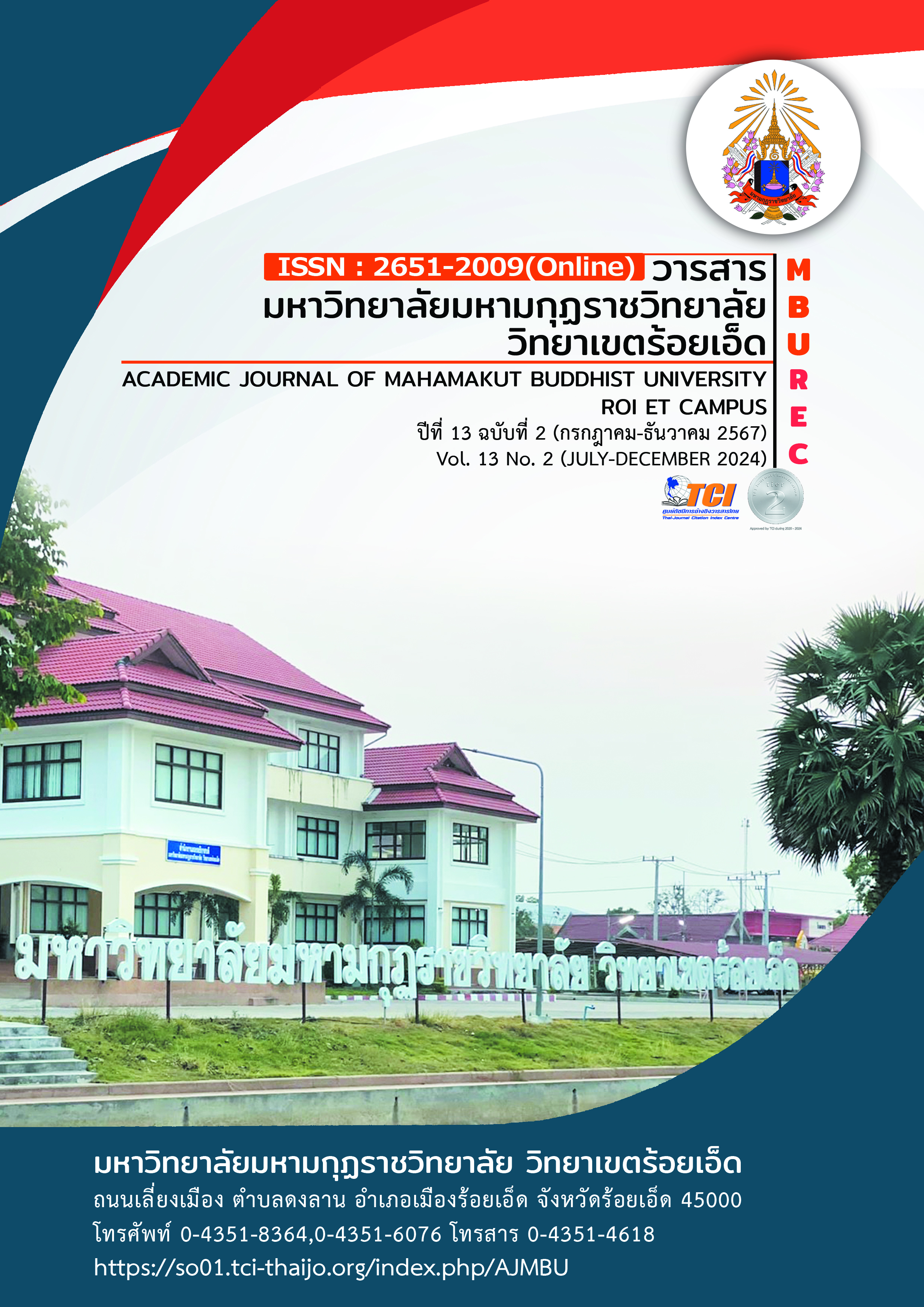AN APPLICATION OF BUDDHADHAMMA PRINCIPLE IN DEVELOPING THE POTENTIALITY OF THE AGED PEOPLE IN PHON NGAM SUBDISTRICT, NONGHAN DISTRICT, UDONTHANI PROVINCE
Main Article Content
Abstract
The purposes of this research are 1) to study the Buddhadhamma principle in developing the potentiality of the aged people in Phon Ngam Subdistrict, Nonghan District, Udonthani Province 2) to study the problematic states in developing the aged people in Phon Gham Subdistrict, Nonhan District, Udothani Province and 3) to apply uddthe Buddhadhama principle for developing the potentiality of the aged people in Phon ngam Subdistrict, Nonghan district, Udothani Province. The research instrument was an interview form. Data analysis was performed using descriptive analysis.
The results of research are found that: 1. The Buddhadhamma principles in developing the potentiality of the aged people in Buddhism are found that the Biddhadahmma principles practiced by the aged people and appropriate for them are the Five Precepts and Five Ennobling virtues, the three bases of the meritoriousness and the Insight development. All of these are the Dhamma principles for prolonging the aged peoples’ life and making the physical and spiritual health well matching with the tradition of the local Heet Sib Song tradition. 2. The Buddhadhamma principles for developing the potentiality of the aged people in Phon Ngarm subdistrict, Nonghan District, Udonthani Province are found that 1) The physical problems result in the aged peoples’ health are mostly found because of the physical decay. Mostly, they are the diabetes, blood pressure and various diseases tfrom eating with their wishes 2) the aspects of the spiritual and emotional problems Some aged people are afraid of abandonment, living alone etc. Some people are in the depressive disorder and can not endure with the things that happen 3) the aspect of family and social problems mostly will be the problems related the income not sufficient for payment because the aged people wait for money from their offsprings effecting on the social status that are divided in groups of the aged people who have different society. So, the creation of participation in various activities of the aged people seem to be difficult. 3. An application of the Buddhadhamma principle in developing the potentiality of the aged people in Pho Ngam Subdistrict, Monghan District, Udonthani Province is found that all activities are the participated activities of Administrative Organization of the Subsets of Subdistricts, community, and temples by using the community activities and the local traditions with integration with Dhamma principle and community activities.
Article Details

This work is licensed under a Creative Commons Attribution-NonCommercial-NoDerivatives 4.0 International License.
References
พระเทพเวที (ประยุทธ์ ปยุตฺโต). (2534). พุทธศาสนากับการแนะแนว. กรุงเทพมหานคร : สมาคมแนะแนวแห่งประเทศไทย.
พระพรหมคุณาภรณ์ (ป.อ. ปยุตฺโต). (2550). ธรรมะสำหรับผู้สูงอายุ. กรุงเทพมหานคร : โรงพิมพ์ธรรมสภา.
พระมหาเชาวฤทธิ์ นรินฺโท (ทรัพย์สวัสดิ์). (2561). การศึกษาแนวทางการพัฒนาคุณภาพชีวิตผู้สูงอายุตามหลักภาวนา 4 : กรณีศึกษาผู้สูงอายุบ้านห้วยหอย ตำบลธาตุทอง อำเภอภูเขียว จังหวัดชัยภูมิ. ดุษฎีนิพนธ์พุทธศาสตรดุษฎีบัณฑิต สาขาวิชาพระพุทธศาสนา. บัณฑิตวิทยาลัย : มหาวิทยาลัยมหาจุฬาลงกรณราชวิทยาลัย.
พระมหาอุทัย กตคุโณ (ประดิษฐ์ศร). (2564). การพัฒนาคุณภาพชีวิตของผู้สูงอายุโดยใช้หลักวิถีพุทธ ในเขตเทศบาลเมืองสุพรรณบุรี จังหวัดสุพรรณบุรี. สารนิพนธ์พุทธศาสตรดุษฎีบัณฑิต. บัณฑิตวิทยาลัย : มหาวิทยาลัยมหาจุฬาลงกรณราชวิทยาลัย.
วิบูลย์พงศ์ พันธุนนท์. (2565). ศึกษาวิเคราะห์โยนิโสมนสิการของผู้สูงอายุเพื่อการดำเนินชีวิตในพระไตรปิฎก. ดุษฎีนิพนธ์พุทธศาสตรดุษฎีบัณฑิต สาขาวิชาพระพุทธศาสนา. บัณฑิตวิทยาลัย : มหาวิทยาลัยมหาจุฬาลงกรณราชวิทยาลัย.
สุดารัตน์ สุดสมบูรณ์. (2559). สวัสดิการสังคมของผู้สูงอายุในประเทศไทย. วารสารเทคโนโลยีภาคใต้. 7(1). 75-85.


